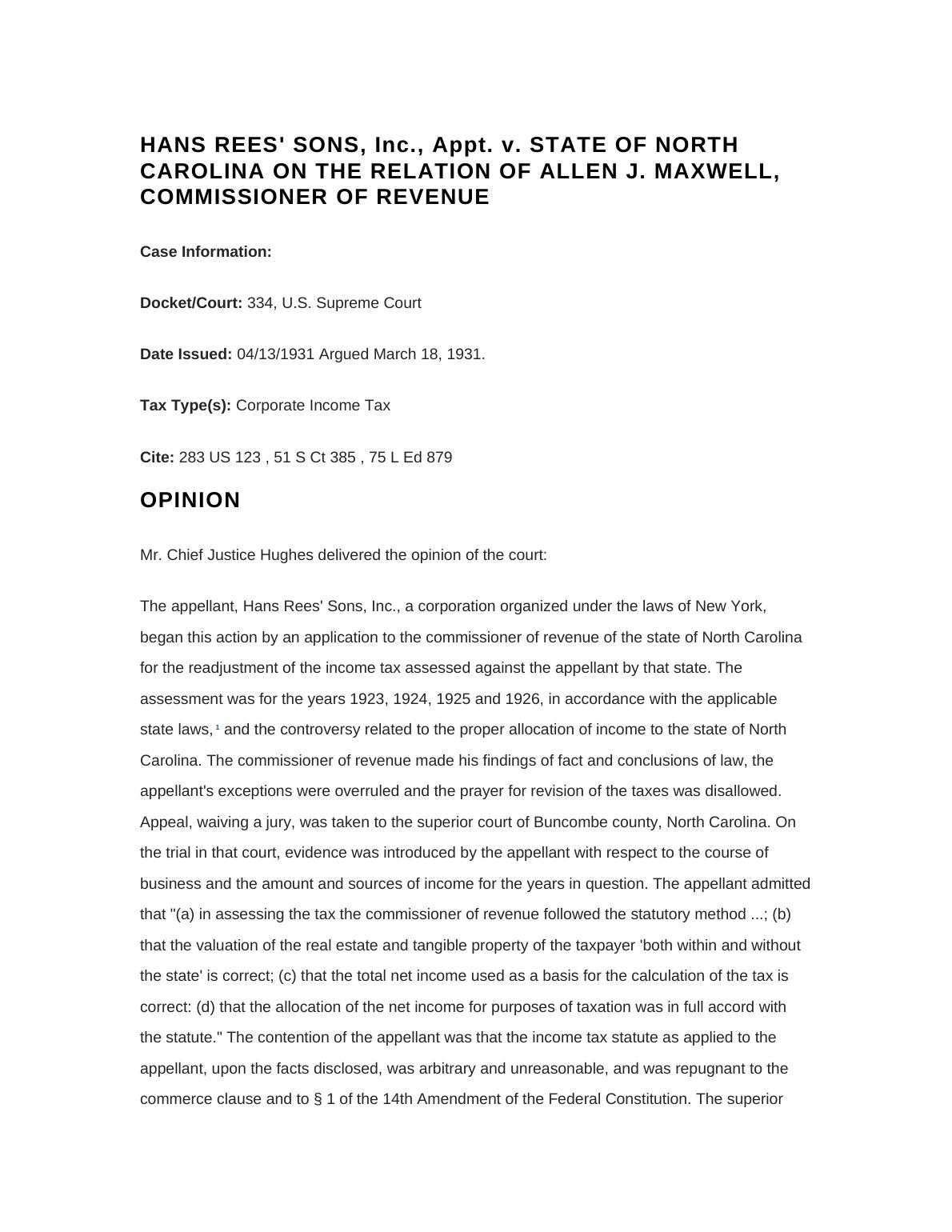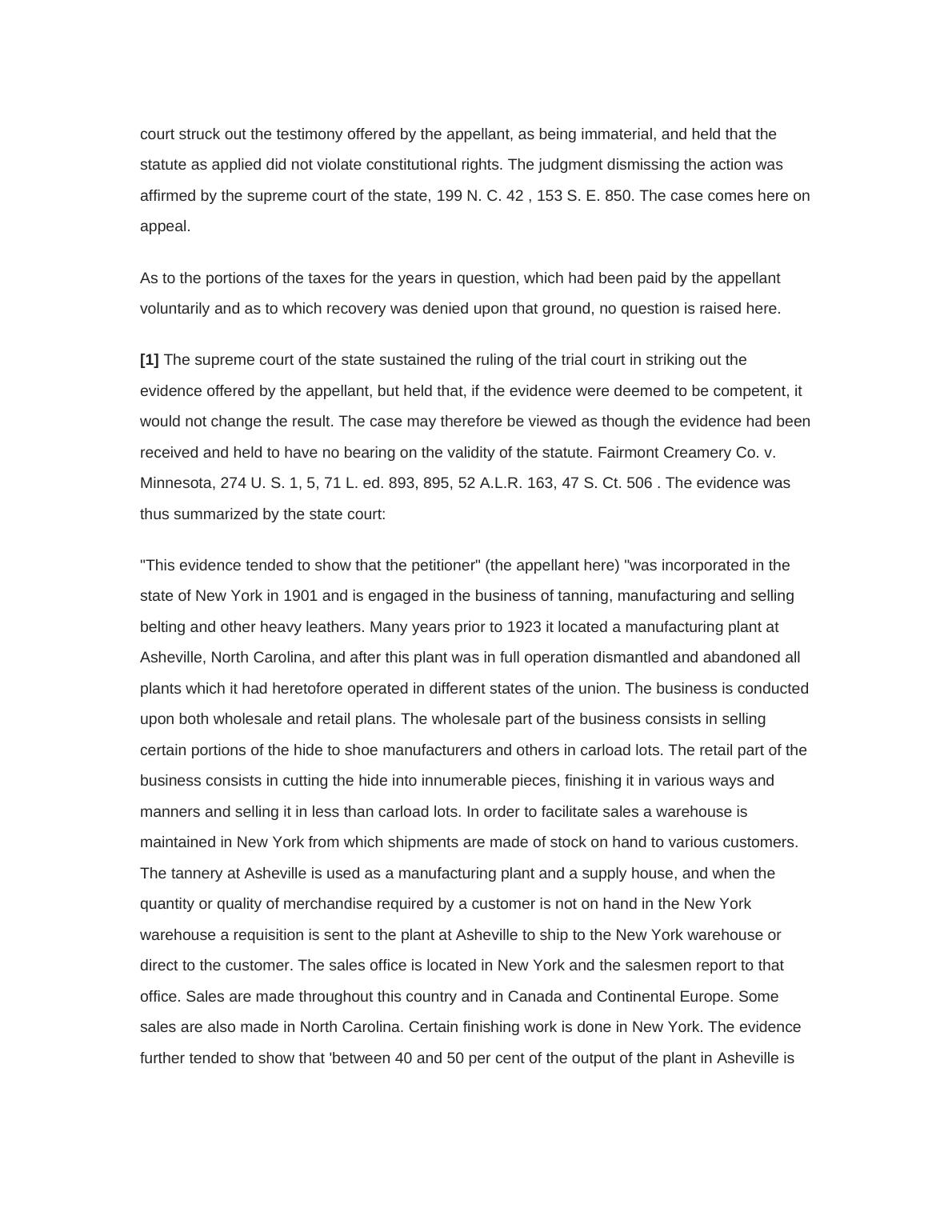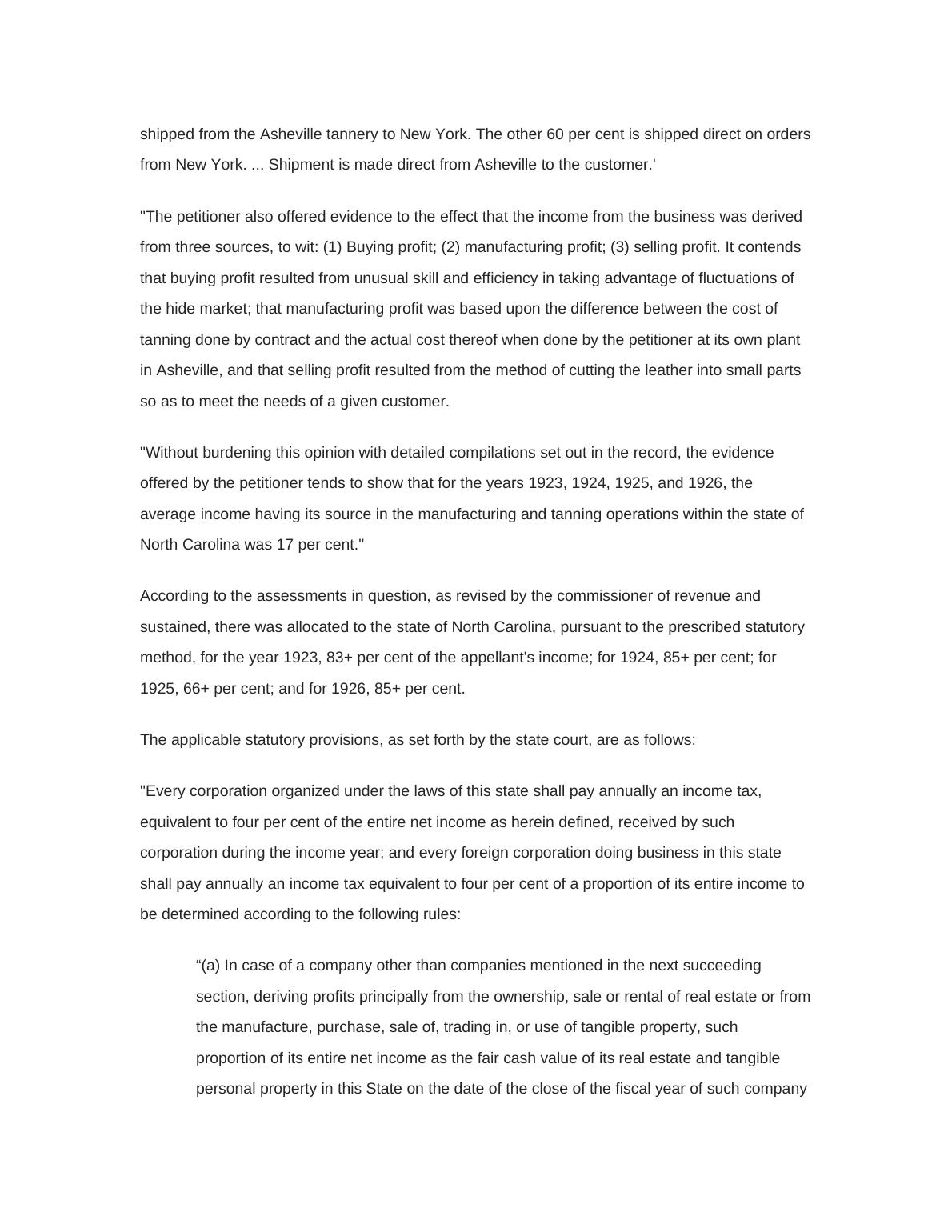Hans Rees' Sons, Inc. v. State of North Carolina - Corporate Income Tax Case
Added on 2019-10-18
9 Pages4302 Words421 Views
HANSREES' SONS, Inc., Appt. v. STATE OF NORTH CAROLINA ON THE RELATION OF ALLEN J. MAXWELL, COMMISSIONER OF REVENUECase Information: Docket/Court: 334, U.S. Supreme Court Date Issued: 04/13/1931 Argued March 18, 1931.Tax Type(s): Corporate Income Tax Cite: 283 US 123 , 51 S Ct 385 , 75 L Ed 879 OPINION Mr. Chief Justice Hughes delivered the opinion of the court: The appellant, HansRees' Sons, Inc., a corporation organized under the laws of New York, began this action by an application to the commissioner of revenue of the state of North Carolina for the readjustment of the income tax assessed against the appellant by that state. The assessment was for the years 1923, 1924, 1925 and 1926, in accordance with the applicable state laws,1 and the controversy related to the proper allocation of income to the state of North Carolina. The commissioner of revenue made his findings of fact and conclusions of law, the appellant's exceptions were overruled and the prayer for revision of the taxes was disallowed. Appeal, waiving a jury, was taken to the superior court of Buncombe county, North Carolina. On the trial in that court, evidence was introduced by the appellant with respect to the course of business and the amount and sources of income for the years in question. The appellant admittedthat "(a) in assessing the tax the commissioner of revenue followed the statutory method ...; (b) that the valuation of the real estate and tangible property of the taxpayer 'both within and without the state' is correct; (c) that the total net income used as a basis for the calculation of the tax is correct: (d) that the allocation of the net income for purposes of taxation was in full accord with the statute." The contention of the appellant was that the income tax statute as applied to the appellant, upon the facts disclosed, was arbitrary and unreasonable, and was repugnant to the commerce clause and to § 1 of the 14th Amendment of the Federal Constitution. The superior

court struck out the testimony offered by the appellant, as being immaterial, and held that the statute as applied did not violate constitutional rights. The judgment dismissing the action was affirmed by the supreme court of the state, 199 N. C. 42 , 153 S. E. 850. The case comes here onappeal. As to the portions of the taxes for the years in question, which had been paid by the appellant voluntarily and as to which recovery was denied upon that ground, no question is raised here. [1] The supreme court of the state sustained the ruling of the trial court in striking out the evidence offered by the appellant, but held that, if the evidence were deemed to be competent, it would not change the result. The case may therefore be viewed as though the evidence had beenreceived and held to have no bearing on the validity of the statute. Fairmont Creamery Co. v. Minnesota, 274 U. S. 1, 5, 71 L. ed. 893, 895, 52 A.L.R. 163, 47 S. Ct. 506 . The evidence was thus summarized by the state court: "This evidence tended to show that the petitioner" (the appellant here) "was incorporated in the state of New York in 1901 and is engaged in the business of tanning, manufacturing and selling belting and other heavy leathers. Many years prior to 1923 it located a manufacturing plant at Asheville, North Carolina, and after this plant was in full operation dismantled and abandoned all plants which it had heretofore operated in different states of the union. The business is conductedupon both wholesale and retail plans. The wholesale part of the business consists in selling certain portions of the hide to shoe manufacturers and others in carload lots. The retail part of thebusiness consists in cutting the hide into innumerable pieces, finishing it in various ways and manners and selling it in less than carload lots. In order to facilitate sales a warehouse is maintained in New York from which shipments are made of stock on hand to various customers. The tannery at Asheville is used as a manufacturing plant and a supply house, and when the quantity or quality of merchandise required by a customer is not on hand in the New York warehouse a requisition is sent to the plant at Asheville to ship to the New York warehouse or direct to the customer. The sales office is located in New York and the salesmen report to that office. Sales are made throughout this country and in Canada and Continental Europe. Some sales are also made in North Carolina. Certain finishing work is done in New York. The evidence further tended to show that 'between 40 and 50 per cent of the output of the plant in Asheville is

shipped from the Asheville tannery to New York. The other 60 per cent is shipped direct on ordersfrom New York. ... Shipment is made direct from Asheville to the customer.' "The petitioner also offered evidence to the effect that the income from the business was derived from three sources, to wit: (1) Buying profit; (2) manufacturing profit; (3) selling profit. It contends that buying profit resulted from unusual skill and efficiency in taking advantage of fluctuations of the hide market; that manufacturing profit was based upon the difference between the cost of tanning done by contract and the actual cost thereof when done by the petitioner at its own plant in Asheville, and that selling profit resulted from the method of cutting the leather into small parts so as to meet the needs of a given customer. "Without burdening this opinion with detailed compilations set out in the record, the evidence offered by the petitioner tends to show that for the years 1923, 1924, 1925, and 1926, the average income having its source in the manufacturing and tanning operations within the state of North Carolina was 17 per cent." According to the assessments in question, as revised by the commissioner of revenue and sustained, there was allocated to the state of North Carolina, pursuant to the prescribed statutory method, for the year 1923, 83+ per cent of the appellant's income; for 1924, 85+ per cent; for 1925, 66+ per cent; and for 1926, 85+ per cent. The applicable statutory provisions, as set forth by the state court, are as follows: "Every corporation organized under the laws of this state shall pay annually an income tax, equivalent to four per cent of the entire net income as herein defined, received by such corporation during the income year; and every foreign corporation doing business in this state shall pay annually an income tax equivalent to four per cent of a proportion of its entire income to be determined according to the following rules: “(a) In case of a company other than companies mentioned in the next succeeding section, deriving profits principally from the ownership, sale or rental of real estate or fromthe manufacture, purchase, sale of, trading in, or use of tangible property, such proportion of its entire net income as the fair cash value of its real estate and tangible personal property in this State on the date of the close of the fiscal year of such company

End of preview
Want to access all the pages? Upload your documents or become a member.
Related Documents
Geoffrey, Inc. v. South Carolina Tax Commissionlg...
|9
|3680
|118
